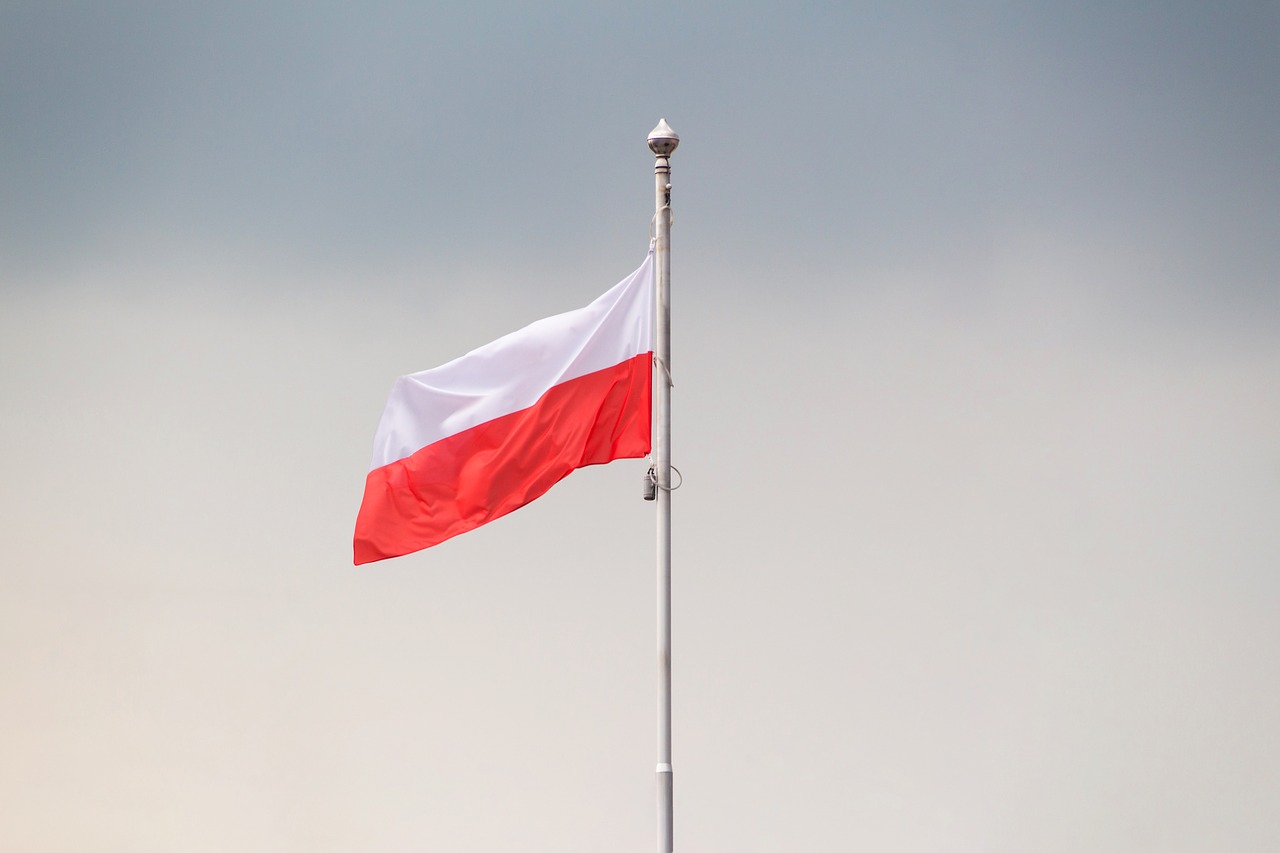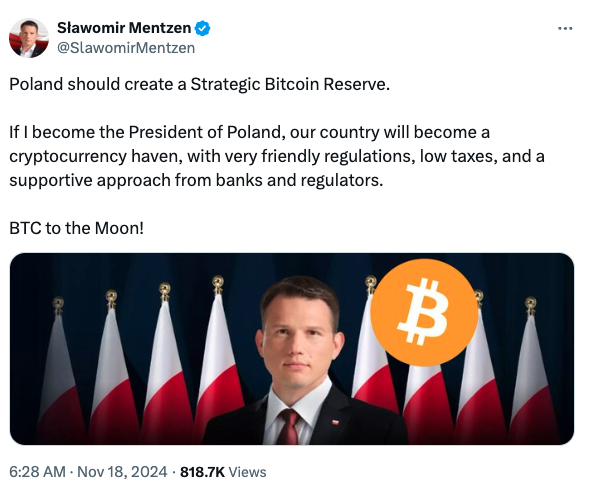
Polish presidential candidate Sławomir Mentzen has vowed to create a Bitcoin reserve if he wins the country’s 2025 election, echoing a similar promise made by U.S. President-elect Donald Trump during his campaign. Mentzen, a prominent figure in Poland’s libertarian and right-wing political circles, made the pledge in a statement posted to X on November 17, where he also reiterated his commitment to making Poland more crypto-friendly if he is elected president.
Mentzen’s remarks came in response to a proposal shared by Lech Wilczynski, the CEO of crypto exchange Swap.ly, who presented an open-source model for a “Strategic Bitcoin Reserve” policy created by the crypto advocacy group, the Satoshi Action Fund. Wilczynski encouraged Mentzen to follow the plan, questioning whether the presidential candidate would prioritize creating a Bitcoin reserve over passing a potentially ineffective crypto regulation bill.

In his reply, Mentzen confidently stated, “Of course,” he would support the establishment of a Bitcoin strategic reserve in Poland. This promise highlights Mentzen’s stance on adopting more cryptocurrency-friendly policies, which has resonated with many in Poland, particularly among voters who advocate for less government intervention in financial matters.
Mentzen’s proposal to establish a Bitcoin reserve draws inspiration from similar ideas put forward in other countries, particularly the United States, where President-elect Donald Trump has made several crypto-related promises, including the creation of a “Strategic Bitcoin Stockpile.” While Trump’s administration is still hypothetical, the idea of governments establishing Bitcoin reserves has gained traction worldwide. This strategic reserve would allow a country to hold a significant amount of Bitcoin to hedge against inflation, national debt, and economic instability.
In the U.S., Senator Cynthia Lummis introduced the “Strategic Bitcoin Reserve” bill in July, aiming to create a Bitcoin fund that would be used to reduce the national debt. The bill proposes that the U.S. Treasury acquire one million Bitcoin over five years and hold it for at least 20 years. Lummis’s plan emphasizes the potential long-term benefits of Bitcoin as a store of value, positioning it as a hedge against the volatility of fiat currencies.
This concept has inspired other nations, such as El Salvador, to take a more proactive approach to Bitcoin acquisition. El Salvador became the first country in the world to legalize Bitcoin as legal tender in 2021, with President Nayib Bukele overseeing the country’s regular acquisition of Bitcoin. As of now, El Salvador holds approximately 5,748.8 Bitcoin in its national reserves.
Another country that has quietly accumulated Bitcoin is the Kingdom of Bhutan. This small Himalayan nation has been mining Bitcoin for years, and in September 2024, Arkham Intelligence revealed that Bhutan holds approximately $780 million in digital assets. Bhutan’s approach has been particularly discreet, with the country using its surplus energy resources to mine Bitcoin and build a digital asset reserve.
Poland’s Move Toward Crypto Adoption
Poland is still in the early stages of developing its approach to cryptocurrency, and the regulatory environment remains uncertain. In August 2022, the Polish government announced it would engage in consultations with industry players, investors, and stakeholders to establish a regulatory framework for the cryptocurrency sector. This process is still ongoing, and no formal policies have been adopted yet.
Mentzen’s comments come amid growing international interest in integrating Bitcoin and other cryptocurrencies into national economic strategies. His proposal to establish a Bitcoin reserve would position Poland alongside countries like El Salvador and Bhutan, which have already made significant moves toward adopting Bitcoin as part of their financial infrastructure.
The idea of a Bitcoin reserve is not just about accumulating cryptocurrency; it is also about positioning a country to benefit from the increasing role of digital assets in the global economy. While there are risks associated with Bitcoin’s volatility, its potential as a store of value and its growing acceptance worldwide make it an appealing option for countries looking to diversify their financial reserves.
Mentzen’s proposal to create a Bitcoin reserve aligns with a broader global trend in which countries are taking a more proactive stance on cryptocurrency adoption. As Bitcoin and other cryptocurrencies continue to grow in popularity and legitimacy, more governments are recognizing their potential as alternative assets. Whether for hedging purposes, economic diversification, or promoting financial freedom, the idea of holding Bitcoin as a strategic reserve is increasingly being seen as a viable option.
However, it is important to note that adopting a Bitcoin reserve comes with challenges. The volatile nature of Bitcoin’s price can make it a risky asset for countries looking to safeguard their reserves. Furthermore, the regulatory uncertainty surrounding digital assets in many countries, including Poland, remains a significant obstacle to fully integrating cryptocurrencies into national financial strategies.
In Poland, the move towards a more crypto-friendly environment will depend on the regulatory frameworks established by the government. If Mentzen’s proposal is implemented, it could be a major step forward in Poland’s financial strategy, positioning the country as a leader in cryptocurrency adoption. However, whether other governments will follow Poland’s lead remains to be seen.
| Country | Bitcoin Reserves (BTC) | Strategy | Date of Acquisition |
|---|---|---|---|
| Poland | Proposed Reserve (1M BTC) | Strategic Bitcoin Reserve | Proposed by Sławomir Mentzen |
| El Salvador | 5,748.8 | Bitcoin as legal tender and national reserve | 2021 |
| Bhutan | $780 million (estimated) | Bitcoin mining and digital asset accumulation | Ongoing |
| United States (Proposed) | 1 million | Strategic Bitcoin Stockpile to hedge national debt | Introduced by Senator Lummis in 2023 |
Bitcoin Reserves – A Bold Step or a Risky Gamble?
The idea of countries building Bitcoin reserves could be a strategic move in the face of global economic uncertainty. Bitcoin’s decentralized nature and growing role as a hedge against inflation make it an attractive option for nations seeking to diversify their financial portfolios. However, Bitcoin’s price volatility presents a significant challenge—holding a large amount of Bitcoin could expose a country’s economy to market swings. Countries like El Salvador and Bhutan have embraced Bitcoin as part of their financial strategy, but their success depends largely on Bitcoin’s continued price growth and regulatory clarity. For Poland and other countries considering similar moves, the challenge will be balancing the potential rewards with the risks. As the world increasingly embraces digital assets, countries that proactively engage with Bitcoin may reap significant benefits, but they must be prepared for the inherent volatility and regulatory uncertainties that come with it.
Featured image credit: ArturLuczka via Needpix
Follow us for more breaking news on DMR
